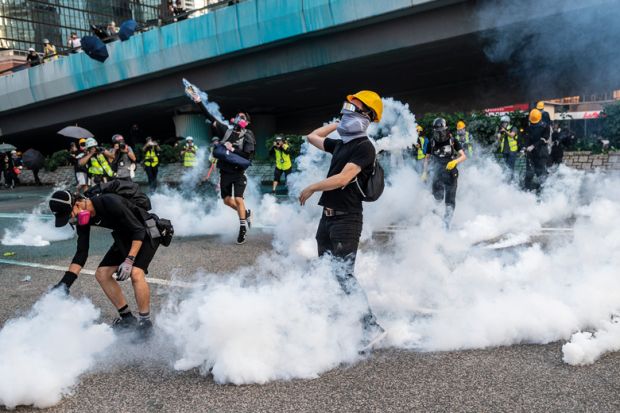Hong Kong’s mass demonstrations have passed the 100-day mark, with protests at one university over the arrest of a student journalist highlighting the impact on the city’s higher education institutions.
Thirteen student unions – including those at Hong Kong’s eight main public universities – are calling for a general strike starting on 1 October, timed to coincide with China’s National Day and the beginning of the Golden Week holiday in mainland China.
Meanwhile, at Hong Kong Baptist University, the arrest of a student and ensuing protests illustrated the fine line that Hong Kong’s university staff must walk – as they balance safeguarding student welfare, condemning violence and working with the authorities.
The student, Boaz So, was covering a protest on 15 September for HKBU journalism school’s Broadcast News Network when he was detained by police on suspicion of carrying an offensive weapon, after they found an instrument in his backpack. The university later described it as a common “table knife”, which Mr So said was for slicing mooncake, a traditional food at the recent Mid-Autumn Festival.
Bruce Lui, director of HKBU’s Chinese Journalism Concentration, told Times Higher Education that Mr So “was clearly identified as a reporter, with press gear like a helmet, vest, and press card issued by the school. The police searched him and other student reporters he was with. As soon as I heard about the arrest, I called people to help.”
Mr Lui was at the police station within an hour, and was joined by a barrister and solicitor. He continued: “I was really worried about [Mr So] – about whether the police would give him a hard time, and whether he would be given a serious charge…The arrest was totally without good cause, since he is a reporter – and student reporters have the same rights as other reporters.”
The following day, HKBU president Ronald Chin wrote in a statement that the university was “deeply concerned”, urging the police to “ensure that the case is handled properly and fairly”.
Hundreds of students rallied on campus, with a smaller faction breaking into the building housing Professor Chin’s office “with rods and rocks” according to student newspaper The Young Reporter. Some of the protesters allegedly vandalised two doors and shouted abuse at staff.
Mr So was released on bail later that evening, but campus protests continued.
In a subsequent statement, Professor Chin emphasised that HKBU supported freedom of expression, academic freedom and a diversity of views. However, he took a harder line over the vandalism, also condemning both physical and verbal “abusive behaviour”.
“This kind of activity is absolutely unacceptable,” Professor Chin wrote. “There can be no excuses. We will take action against the perpetrators, including initiating disciplinary procedures.”
Mr Lui said that “the students were motivated by concern for [Mr So] and other student reporters. I admire their good intentions. But when they demonstrated in the building housing the president’s office, that was vandalism, and I don’t want more students punished because of the incident.”
Debate over the protests continued at the University of Hong Kong, where academics held an off-the-record discussion on 20 September about ethics related to “Issues about the Rule of Law and Violence in the HK Protests”.
But all eyes were on a gathering outside the university, where masked protesters called for US lawmakers to pass the Hong Kong Human Rights and Democracy Act, which aims to establish US protections for democracy in Hong Kong. In an example of the social media-savvy nature of protests, two student protesters bearing a trumpet and a tuba played The Star-Spangled Banner before being joined by the crowd in singing the US national anthem.
POSTSCRIPT:
Print headline: Campuses walk fine line on protests
Register to continue
Why register?
- Registration is free and only takes a moment
- Once registered, you can read 3 articles a month
- Sign up for our newsletter
Subscribe
Or subscribe for unlimited access to:
- Unlimited access to news, views, insights & reviews
- Digital editions
- Digital access to THE’s university and college rankings analysis
Already registered or a current subscriber? Login







